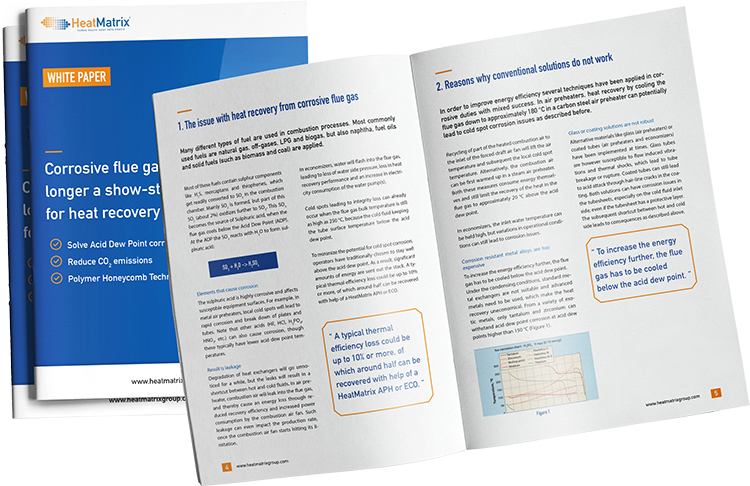HEAT EXCHANGER TYPES – HEAT RECOVERY
In the industry, many different types of heat exchangers are being used.

What types of heat exchangers are available?
The most common types are:
- (Finned) Tubular heat exchangers
- Plate heat exchangers
- Shell and tube heat exchangers
For what applications are exchangers installed?
- Gas to Gas heat transfer
- Gas to Liquid heat transfer
- Liquid to liquid heat transfer
Where to install heat exchangers?
A very good place to apply heat exchangers is on the flue gas of your stack or exhaust air of your dryer. Significant amounts of energy are lost via the stack. These losses are in the order of 10% of the thermal duty of a combustion process. Interested in how we turn this into your opportunity? Download our white paper to learn more.
How can you monetize the recovered heat from flue gas?
Transfer the heat into:
- Air with an Air Preheater (APH) to heat up Combustion or Drying Air
- Water with an Economizer (ECO) to heat up (process) water or export heat to grid
- Water with a Condenser to heat up water using latent heat of condensation
How can you monetize the recovered heat from flue gas?
Transfer the heat into:
- Air with an Air Preheater (APH) to heat up Combustion or Drying Air
- Water with an Economizer (ECO) to heat up (process) water or export heat to grid
- Water with a Condenser to heat up water using latent heat of condensation
What does heat recovery form flue gas mean for you?
- Energy savings
- CO2 emission reduction
- Investment with short payback time
We specialize in Air Preheaters (APH: Flue Gas to Air) and Economizers (ECO: Flue Gas to Water). If you want to discuss any of these solutions, please contact us
Does your fuel contain sulphur or your flue gas contain corrosive components?
Are you concerned about acid dew point corrosion? The solutions are:
- A polymer air preheater
- A polymer economizer
- A polymer condenser
Corrosive flue gas is no longer a showstopper for heat recovery

Where should we send the white paper to?
Do you want to learn more about the Acid Dew Point and about how cooling through the acid dew point increases your energy efficiency? Please download the White Paper or contact us.
